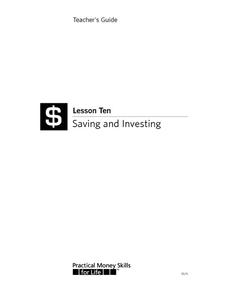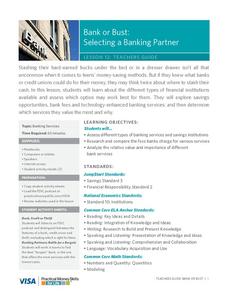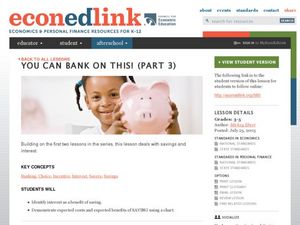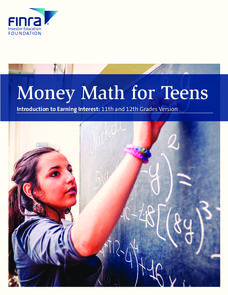Visa
Make It Happen: Saving for a Rainy Day
Every little penny counts, especially when it comes to saving for emergencies or long-term goals. Pupils evaluate different saving and investment strategies, such as a CD or money market account, through worksheets and by researching...
Curated OER
Money Management Part III: Savings Accounts and Cash vs. Credit
Help your class understand the importance of saving and managing their money. Here is part three to a unit on credit, cash, and savings. Learners discuss savings accounts and the idea that a budget plan can help them avoid costly credit...
PricewaterhouseCoopers
Saving and Investing: Building Wealth for Financially-Secure Futures
While spending is fun, saving for a retirement is the future. Young adults learn about the importance of saving and different opportunities to do so during their adulthood.
Curated OER
Savings Account Introduction Lesson
This teaching tool promotes a practical understanding of basic mathematical skills by having learners determine percents on interest. There are several worksheet options available as well as a guid on how best to use them.
Council for Economic Education
A Penny Saved
A penny saved is a penny earned! Scholars research the different ways to save money over a lifetime. They investigate the Rule of 72, compound interest, and sub-prime loans to gain an understanding of how banks aid in the saving process....
Visa
Saving and Investing
Impress upon your young adults the importance of saving and investing, and give them a foundational vocabulary from which they can continue to build their financial literacy. This lesson plan covers short- and long-term budget goals,...
Practical Money Skills
Saving and Investing
Learn the difference between saving money and investing money, as well as the advantages and disadvantages of each. Kids review banking and personal finance terms before studying the different ways that people can reach their financial...
Curated OER
Investing Money
Sixth graders participate in an simulated investment activity. They examine the purpose of different types of investments before they predict which will be the most successful. Finally, they simulate investing $1,000 in stocks, $1,000 in...
Visa
Nothing But Net: Understanding Your Take Home Pay
Introduce your young adults to the important understanding that the money they receive from their paychecks is a net amount as a result of deductions from taxes. Other topics covered include federal, state, Medicare and social security...
Curated OER
A Lifetime of Savings
Sometimes people who seem to lead what would be considered an ordinary life do extraordinary things. Such was the case with Oseola McCarty, who donated a large sum of money for a university scholarship fund in her name. Oseala lived her...
Curated OER
Saving For Retirement
Learners examine the fundamentals related to saving for retirement and investing such as return on investment, compound interest, and planning for different rates of savings. They see the importance of setting long term saving goals.
Visa
Bank or Bust: Selecting a Banking Partner
Why shouldn't we just save all our money in our mattress? Couldn't our money disappear? Pupils discover the benefits of utilizing banks and credit unions for saving money, as well as how to evaluate different types of institutions by...
Federal Reserve Bank
Your Budget Plan
What do Whoosh and Jet Stream have in common? They are both characters in a fantastic game designed to help students identify various positive and negative spending behaviors. Through an engaging activity, worksheets, and discussion,...
PricewaterhouseCoopers
Planning and Money Management: Financial Plan
More planning goes into a budget than a high schooler thinks. Here, they learn about the expected expenses and incomes, along with outside factors such as natural disasters. Learners prepare their own budget and adjust it based on the...
Council for Economic Education
You Can Bank On This! (Part 3)
Young scholars use a chart to show how gaining interest is a beneficial part of having a savings account. In this banking lesson plan, learners also learn about the workings of an ATM and a checking account.
SaveandInvest.org
Introduction to Earning Interest: Middle School
Does your bank pay you for allowing them to hold your money? Class members research three different ways they can earn money using money already in the bank. Topics include certificates of deposit, statement savings accounts, and money...
Curated OER
Saving and Creating a Personal Budget
Fifth graders brainstorm ways to save money. In this financial awareness lesson, 5th graders read a chapter from the book, From the Mixed-Up Files of Mrs. Basil E. Frankweiler and create a personal budget for themselves.
Practical Money Skills
Using Banking Services
Using a bank is a privilege and a responsibility for young consumers. Teach them the important terms and details about creating accounts, using an ATM, and maintaining a credit card.
Curated OER
Reading Logs
Students create reading logs. In this reading logs instructional activity, students create a monthly reading log with a theme. The reading log has a goal record sheet, minutes read sheet, and award list.
Curated OER
Accounting: Changes That Affect Owner's Equity
Students study transactions that affect the owner's equity of a proprietorship. They explore revenue, expenses and withdrawals and how they fit into the accounting equation. They complete online activities and a quiz.
SaveandInvest.org
Introduction to Earning Interest: Grades 11-12
Does your bank pay you for allowing them to hold your money? Class members investigate three different ways money can make more money. Topics include certificates of deposit, statement savings accounts, and money market accounts. This...
Wells Fargo
Hands on Banking
Encourage middle schoolers to be proficient and knowledgeable in the economic world with a series of personal finance lessons. Focusing on banking, credit, budgets, and investing, the activities guide learners through financial literacy...
SaveandInvest.org
Introduction to Earning Interest: Grades 9-10
Does your bank pay you for allowing them to hold your money? The lesson covers three different ways your money can make money. Topics include certificates of deposit, statement savings accounts, and money market accounts.
Howard County Schools
Generous Aunt
Witness the power of exponential growth with an activity that investigates two different savings plans. Class members create tables of values to see how and when a savings plan increasing exponentially exceeds one increasing linearly.

























